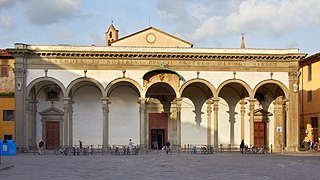
The Basilica della Santissima Annunziata is a Renaissance-style, Catholic minor basilica in Florence, region of Tuscany, Italy. This is considered the mother church of the Servite Order. It is located at the northeastern side of the Piazza Santissima Annunziata near the city center.

Sant'Andrea della Valle is a minor basilica in the rione of Sant'Eustachio of the city of Rome, Italy. The basilica is the general seat for the religious order of the Theatines. It is located at Piazza Vidoni, at the intersection of Corso Vittorio Emanuele and Corso Rinascimento.

Santa Maria dei Miracoli and Santa Maria di Montesanto are two churches in Rome.

San Carlo ai Catinari, also called Santi Biagio e Carlo ai Catinari, is an early-Baroque style church in Rome, Italy. It is located on Piazza Benedetto Cairoli, 117 just off the corner of Via Arenula and Via dei Falegnami, a few blocks south of the church of Sant'Andrea della Valle.
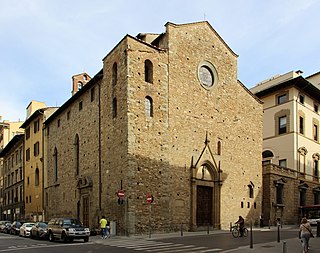
Santa Maria Maggiore di Firenze is a Romanesque and Gothic-style, Roman Catholic church in Florence, region of Tuscany, Italy. This is among the oldest extant churches in Florence.

The Basilica dei Santi Bonifacio e(d) Alessio is a basilica, rectory church served by the Somaschans, and titular church for a cardinal-priest on the Aventine Hill in the third prefecture of central Rome, Italy.

Prato Cathedral, or Cathedral of Saint Stephen, is a Roman Catholic cathedral in Prato, Tuscany, Central Italy, from 1954 the seat of the Bishop of Prato, having been previously, from 1653, a cathedral in the Diocese of Pistoia and Prato. It is dedicated to Saint Stephen, the first Christian martyr.

San Silvestro al Quirinale is a historic church in central Rome, Italy. It is located near Via XXIV Maggio corner with Via Mazzarino, a few blocks south of the Piazza del Quirinale.
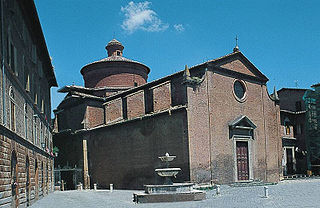
Santo Spirito is a Renaissance style, Roman Catholic church located in piazza Santo Spirito, where Via dei Pispini meets Vicolo del Sasso, in Siena, Italy.

San Gaetano, also known as Santi Michele e Gaetano, is a Baroque church in Florence, Italy, located on the Piazza Antinori, entrusted to the Institute of Christ the King Sovereign Priest.

Pistoia Cathedral, or Cathedral of Saint Zeno is the main religious building of Pistoia, Tuscany, central Italy, located in the Piazza del Duomo in the centre of the city. It is the seat of the Bishop of Pistoia and is dedicated to Saint Zeno of Verona.

Sant'Andrea is a church in Pistoia, Tuscany, central Italy that served as a pieve or place that congregations from surrounding village churches use for baptism. It is dedicated to St. Andrew the Apostle, and includes the famous Pulpit of Sant' Andrea by Giovanni Pisano. The church probably dates from as early as the 8th century, though in a smaller size. In the 12th century it was extended in length.

The Basilica of Our Lady of Humility or Madonna dell'Umiltà is a Renaissance-style, Roman Catholic Marian basilica in Pistoia, region of Tuscany, Italy.

Gesù e Maria is a Baroque church located on Via del Corso in the Rione Campo Marzio of central Rome, Italy. It faces across the street the similarly Baroque facade of San Giacomo in Augusta.

Volterra Cathedral is a Roman Catholic cathedral in Volterra, Italy, dedicated to the Assumption of the Virgin Mary. It is the seat of the bishop of Volterra.
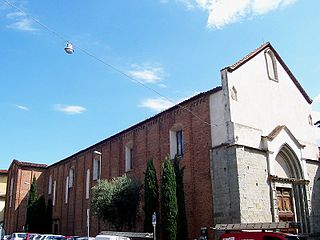
San Domenico is a Romanesque and Gothic-style, Roman Catholic church located in the Piazza of the same name, with a north flank of the nave parallel to Corso Silvani Fedi, in Pistoia, region of Tuscany, Italy.

Sant'Andrea a San Donnino is a Roman Catholic parish church in the San Donnino neighborhood of the town limits of Campi Bisenzio, located on the Via Pistoiese just west of Florence, in the region of Tuscany, Italy. Adjacent to the church is a small art Museum.

Santa Maria or Santa Maria a Campi is a Roman Catholic parish church located on Via Spartaco Lavagnini #26 in Campi Bisenzio, just west of Florence, in the region of Tuscany, Italy.
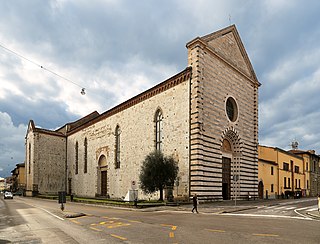
San Francesco is a Gothic-style, Roman Catholic church located on the piazza of the same name in Pistoia, region of Tuscany, Italy.

The church and convent of the Santissima Annunziata is a Baroque-style, Roman Catholic church located on Piazza de Servi #4, Pistoia, region of Tuscany, Italy. The convent presently functions as a warehouse. The church is down via Laudesi from the San Desiderio, and via Piazza de Servi, From San Giovanni Decollato.





















